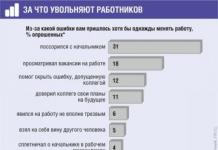A reprimand is a special type of disciplinary sanction that is applied to employees who have violated certain internal rules, committed negligence and errors in work, and also have any other offenses against the organization. It is believed that a reprimand is a punishment of medium severity, intermediate between a simple reprimand and dismissal, a serious warning about the inadmissibility of repeating such violations.
FILES
An important condition is that a reprimand is issued only in cases where it is established that the offense was committed precisely through the fault of the employee, and not due to some external factors (force majeure, fires, accidents, floods, etc.).
Before issuing an order
The procedure for imposing disciplinary sanctions is strictly regulated by the labor legislation of the Russian Federation. In particular, any order relating to employees of an organization, including this one, must have some written basis. In this case, their role is usually played by
- a memorandum from the head of the structural unit in which the offending employee works,
- explanatory note from the employee,
- an act establishing the discovery of a violation, etc.
If an employee refuses to provide an explanation for the misconduct that occurred, this must be recorded in a separate document.
The employer has the right to issue an order to issue a reprimand no later than a month after the fact of the offense is established (this does not take into account the employee’s illness, vacation, etc. periods of absence on legal grounds). Do not forget that for one offense the employer has the right to impose only one disciplinary punishment out of three main ones:
- dismissal,
- rebuke,
- comment.
Rules for drawing up an order
As of today, there is no standard unified form for an order to issue a reprimand. Enterprises and organizations can develop its form at their own discretion and based on their own understanding of this document or use widely used templates. In any case, when creating it, you must adhere to certain standards.
In particular, this document must contain information about the employer and employee, the reason for the reprimand and links to supporting documents.
The employee in respect of whom the order is issued is obliged to familiarize himself with it and put his signature on it. If you refuse to sign a document, you need to draw up a corresponding act (you should never forget that a subordinate can challenge the employer’s actions in court or complain about him to the territorial labor inspectorate).
Information about a single reprimand is not entered into the employee’s work book, but is recorded in the order of dismissal for systematic violations, if such occurs during the period of its validity.
The order form itself, completed in accordance with all the rules, after entering into force, is transferred for storage to the archive of the enterprise, where it is kept for the period established for such documents by the legislation of the Russian Federation.
Rules for completing an order
The order is issued in a single copy
- on a regular A4 sheet
- or on the company’s letterhead (the latter option is preferable - there is no need to additionally enter the organization’s details).
You can write it either by hand or print it on a computer. But regardless of which option is chosen, the order must be certified with a “live” autograph of the head of the organization. There is no need to put a seal on it, since it relates to the internal documentation of the enterprise and, moreover, since 2016, legal entities may not use seals and stamps at all to endorse papers.
An example of writing an order to issue a reprimand
Filling out the document header
At the very beginning of the document, usually on the right or left (it doesn’t matter), the name of the company is written indicating its organizational and legal status (i.e. CJSC, OJSC, Individual Entrepreneur, LLC). Then the word “Order” is entered, its number is entered in accordance with the document flow within the company, and the date of its creation is indicated. Next, two or three words indicate the meaning of the document.
Filling out the body of the document
This is followed by the information part of the order. This includes detailed information about the violation and the reason for the penalty (in other words, the essence of the claim against the employee is described). The date of the offense, surname, patronymic name, employee and a link to the law regulating the employer’s actions in such situations must be noted here.
Further, after the word “I order”, a corresponding order is entered to issue a reprimand and a person responsible for its execution is appointed (usually this is the immediate supervisor of the offender or the head of the personnel department - here you must indicate his position, last name, first name, patronymic). Below are links to the documents that became the basis for the order (, act, etc.).
Signatures of interested parties
Finally, the order must be certified by the signatures of all interested officials, including the head of the company, the head of the structural department and the offending employee himself.
After the order is issued
A reprimand order can have a wide range of consequences. Most often, this is deprivation of a bonus or any other bonuses on the part of the employer (but this is possible only if the company uses a bonus system). Another option for the development of events if the employee does not draw conclusions from the current situation and continues to commit violations in his work is a repeated reprimand and further dismissal.
It is worth noting that the order to issue a reprimand is a priori valid for one year. But if the employer wants to remove it ahead of schedule, then he can do this at any time by issuing an appropriate order.
After the reprimand order is terminated, the employee is considered to have no disciplinary sanction and is “clean” before the employer.
M.G. Sukhovskaya, lawyer
We announce a reprimand or reprimand
How to correctly apply these disciplinary sanctions to an employee
Of course, it is necessary to influence negligent employees. In particular, with the help of disciplinary sanctions, of which there are only three Art. 192 Labor Code of the Russian Federation:
- comment;
- rebuke;
- dismissal (in strictly prescribed cases by law).
Other penalties no and cannot be. There are no severe reprimands or reprimands entered into your personal file.
Attention
Behind one disciplinary offense can only be applied one penalty Art. 193 Labor Code of the Russian Federation.
If you subject an employee to a non-existent penalty and then fire him for repeated misconduct clause 5 art. 81 Labor Code of the Russian Federation, the court may declare the dismissal illegal only on the grounds that the originally imposed penalty is not provided for by the Labor Code. see, for example, Cassation ruling of the Judicial Collegium for Civil Cases of the Orenburg Regional Court dated October 5, 2011 No. 33-6209/2011.
And even more so, fines cannot be applied to employees as a punishment. see, for example, Determination of the Moscow City Court dated June 17, 2010 No. 33-18087, demotion, postponement of vacation and the like. As for the deduction of a so-called disciplinary fine from an employee’s salary, in the event of an appeal against such a penalty, the employer will have to pay the employee all the money withheld along with interest for the delay in payment of wages. Art. 236 Labor Code of the Russian Federation.
For example, for civil servants this is a warning about incomplete job compliance and clause 3, part 1, art. 57 of the Law of July 27, 2004 No. 79-FZ. There are similar penalties for employees of the customs service and internal affairs bodies, and a severe reprimand may also be applied to them. Art. 29 of the Law of July 21, 1997 No. 114-FZ; Part 1 Art. 50 of the Law of November 30, 2011 No. 342-FZ.
WE WARN THE MANAGER
If the labor inspectorate reveals the fact of application to an employee of a penalty not specified in the Labor Code of the Russian Federation, the employer faces a fine Part 1 Art. 5.27 Code of Administrative Offenses of the Russian Federation:
- for a company - 30,000-50,000 rubles;
- per manager - 1000-5000 rubles.
The order itself regarding such a penalty will be required to be cancelled. And if this is not done, then the company and its directors may again be fined for failure to comply with a legal order of the regulatory authority. Part 1 Art. 19.5 Code of Administrative Offenses of the Russian Federation.
In this article we will look at the procedure for issuing penalties such as reprimands and reprimands. But first we want to remind you of this. The employer has the right to apply disciplinary sanctions if the employee fails to perform or improperly performs his duties. Art. 192 Labor Code of the Russian Federation. But these responsibilities must be documented - in an employment contract, job description or local regulation (for example, in internal labor regulations), and the employee must be familiarized with them on signature Art. 68 Labor Code of the Russian Federation. In other words, the rule applies here: if the employer has not familiarized the employee with the document setting out his duties, then the employee is released from liability for failure to fulfill them. see, for example, Determination of the Samara Regional Court dated July 30, 2012 No. 33-6996.
Deadlines for applying penalties
In order to reprimand or reprimand an employee, or rather issue an appropriate order, the employer has 1 month from the date of discovery of the disciplinary offense Art. 193 Labor Code of the Russian Federation, that is, from the day when the violation became known to the immediate supervisor of the offending employee (for example, the head of department a).
Monthly term clause 34 of the Resolution of the Plenum of the Supreme Court of March 17, 2004 No. 2:
- extended for the duration of an employee’s illness or while he is on any leave (annual paid, additional, educational, at his own expense, etc.);
- not renewed for days on which the employee was absent from work for some other reason, for example, on additional days off.
WE TELL THE MANAGER
Even if it's obvious What a specific employee has committed a disciplinary offense, he cannot be reprimanded or reprimanded outside the statute of limitations for bringing him to disciplinary liability.
At the same time, it will not be possible to issue a reprimand or reprimand if it has been 6 months Art. 193 Labor Code of the Russian Federation. The six-month period increases to 2 years if the misconduct is revealed as a result of an audit or audit (for example, during the inventory, a shortage of goods and materials was discovered due to the fault of the storekeeper).
The mentioned deadlines are restrictive for the employer and cannot be restored. Omission of them excludes the possibility of applying disciplinary sanctions to the employee see, for example, Appeal rulings of the Novgorod Regional Court dated December 11, 2013 No. 2-5088-33-2076; Omsk Regional Court dated 08/07/2013 No. 33-5026/2013.
Disciplinary procedure

STEP 1. We record the presence of certain circumstances that may subsequently be classified as an employee’s misconduct. This can be done by composing:
- a report or memo addressed to the general director;
- act;
- decisions of the commission (for example, based on the results of an investigation into the fact of causing damage to the employer).
Note that the act is the most optimal document, since the facts stated in it will be witnessed by several people (usually three).
If an employee goes to court over an imposed penalty, these are the people who can be witnesses on the employer’s part.
Here is a sample certificate of absence from work.
Certificate of absence from work
dated August 25, 2014 No. 2
We, the undersigned:
N.L. Zotova - Head of HR Department,
K.D. Bushueva - accountant,
IN. Klintsova - manager of the distribution department, -
They drew up this report stating that on August 25, 2014, secretary Natalya Mikhailovna Petrova was absent from her workplace during the entire working day, from 10.00 to 19.00, and it was not possible to contact her by phone.
STEP 2. We require a written explanation from the employee by handing him a corresponding notice.
Limited Liability Company "Character"
Secretary N.M. Petrova
Notification
the need to provide written explanations
Moscow
I inform you that within 2 working days The employee has 2 full working days to provide explanations Art. 193 Labor Code of the Russian Federation, which are counted from the date following the day the corresponding demand was presented to him. Reducing this period is a violation of the employee’s rights and a strong argument for the court in favor of canceling the penalty Determination of the Moscow City Court dated July 6, 2010 No. 33-19977 from the date of receipt of this notice you must submit to me written explanations The employer is obliged to request a written explanation from the offending employee in writing. Art. 193 Labor Code of the Russian Federation. If this is not done, the procedure for imposing a disciplinary sanction will be violated and the penalty applied to the employee will be considered unlawful. see, for example, Determination of the St. Petersburg City Court dated October 3, 2013 No. 33-15303/2013 about the reasons for your absence from work on August 25, 2014 during the entire working day, from 10.00 to 19.00.
WE TELL THE MANAGER
The fact that the employee did not provide a written explanation for his misconduct, does not prevent the employer from bringing him to disciplinary liability and Art. 193 Labor Code of the Russian Federation. And if, as a result of the misconduct, the employer suffers any material damage, then he will also be subject to financial liability. Articles 192, 248 of the Labor Code of the Russian Federation.
Further actions of the employer depend on the following:
- <если>the employee has submitted an explanatory note - the manager must decide whether the reason for the misconduct is valid. If the reason is disrespectful, should the employee be punished and (if so) what penalty should be applied to him;
- <если>the employee did not give any explanations - it is necessary to draw up an act of failure to provide or refusal to provide an explanation in any form Art. 193 Labor Code of the Russian Federation. And then decide on the issue of bringing the offender to justice.
If the employee immediately refused to give any explanation for his misconduct, there is no need to rush to draw up an act of refusal and issue an order to impose a penalty right on the day the explanation is requested. It is better to wait the 2 working days allotted by law. This way you will deprive the employee of the chance to later claim in court that he was not given the opportunity to change his mind and give an explanation.
Although some courts do not see anything illegal in bringing an employee who refused to “explain” to disciplinary action right on the day when he was asked for an explanation see, for example, Appeal ruling of the Altai Regional Court dated 07/09/2013 No. 33-5006-13; Determination of the St. Petersburg City Court dated 09/08/2010 No. 12408.
STEP 3. We issue an order in any form to announce a reprimand or reprimand. It should briefly describe the offense (the so-called stating part of the order) and refer to all the papers drawn up in connection with this.
Limited Liability Company "Character"
Order No. 11
Moscow
About reprimanding
Due to the absence of secretary Natalya Mikhailovna Petrova from the workplace on August 25, 2014 from 10.00 to 19.00 without good reason on the basis of Articles 192, 193 of the Labor Code of the Russian Federation
I ORDER:
For violation of labor discipline (clause 3.4 of the internal labor regulations of Character LLC), declare N.M. Petrova's reprimand.
Applications:
1) certificate of absence from work dated August 25, 2014 No. 2;
2) explanatory note by N.M. Petrova dated 08/27/2014.
I have read the order The employee must be familiarized with the order against signature within 3 working days since its publication. If an employee was absent from work for some reason (was temporarily disabled, was on a business trip, etc.), then the period of his absence freezes the course of this period. In the event that an employee refuses to familiarize himself with the order, a report about this must be drawn up in a free form. Art. 193 Labor Code of the Russian Federation
| Secretary |
Violations of labor discipline - we punish the employee
Labor legislation provides for the creation of each organization's own rules of procedure. It is this document that employees are guided by, because it describes all labor issues and issues that arise at the enterprise: the start and end times of the working day, the procedure for calculating wages and even the specifics of trade secrets.
Even a slight delay or leaving the workplace for 5 minutes can be considered a violation of labor discipline. Such seemingly harmless offenses can result in heavy penalties. Therefore, it is very important to learn to identify those actions that are violations, as well as assess the possible punishment for them.
Violation of labor discipline - definition and types

First you need to understand the basic concepts. Labor discipline is a set of rules that apply to an enterprise and are mandatory for all its employees. These include work rules, corporate ethics, labor protection rules, etc. The employer himself, in addition to creating these rules, must ensure the possibility of their implementation, because if he does not do this, then any violation by the employee of any rule will be recognized as the fault of his superiors.
To understand why various penalties can be applied to employees, you need to clearly understand those actions that constitute a violation of discipline and what it is.
Responsibilities of the employee
The Labor Code defines a number of responsibilities that are inherent to an employee, namely:
- Compliance with all fixed rules and labor standards.
- High-quality and conscientious performance of official duties.
- Compliance with work rules, labor protection and various regulations and requirements that are present in the workplace.
- Take care of the material property that the enterprise has.
- Notify your management if any hazards arise that could harm other employees.
It is believed that if an employee has violated at least one of these points, he has violated labor discipline.
Types of labor discipline violations
There are three groups of violations that an employee can commit, depending on the characteristics of the work process itself:
So, if an employee contributes to the damage of products, then he will commit a technological offense, and if he is late for the workplace, then he will commit a security offense.
Each violation entails the collection of supporting documents and an investigation.
List of labor discipline violations
Among the most common offenses that are associated with violation of labor discipline are:
From this entire list, gross violations include constant absenteeism, forgery of documents, theft, attending work while drunk, or committing some illegal act.
All types of failure to fulfill their work duties are divided according to the following criteria:
Disciplinary offenses are acts of violation of discipline during the performance of official duties.
Also, every employer must be able to distinguish between misconduct and financial liability, because if an employee has caused some kind of material damage, then the liability for this may continue after the end of the employment relationship.
Penalties for violations of labor discipline
Article 192 of the Labor Code defines several penalties that apply to employees in the Russian Federation:
If one of the local documents indicates the possibility of depriving a bonus for misconduct, then the employer can take advantage of it.
In the event that there are Federal laws describing special methods of punishment, then they can also be applied.
 Reprimand for violation of labor discipline
Reprimand for violation of labor discipline
In case of violation of discipline, a report is created about this with a detailed description of the offense, the chosen punishment and the explanation of the employee himself. Although the remark does not cause much harm, it can stop the employee from systematic violations that are caused by repetition of misconduct.
Reprimand for violation of labor discipline
The reprimand that is issued when a disciplinary offense is committed is of two types: ordinary and strict. It must be written down in the order, but is not indicated in the work book. It can only note the dismissal, which was due to constant violations and failure to perform one’s work.
Dismissal for violation of labor discipline
It is believed that dismissal is the last resort of all possible penalties. It is assigned if a person has committed a very serious violation or stopped working. So, in banking institutions, for example, they can safely fire you if an employee has committed theft of property.
Responsibility for violation of labor discipline
Labor legislation states that all employees are responsible for their actions and are required to familiarize themselves with the labor protection rules, procedures and other requirements upon signature. The employer retains the right to impose penalties if the employee violates something. At the same time, they are compared with the complexity of the offense.
The procedure for punishment for a disciplinary offense
The authorities independently choose the punishment, which should be based on existing information and legislative norms.
Act on committing a disciplinary offense
Each violation must be recorded using an act. This paper is created by the employee’s superiors together with witnesses. Then the document, after signing, is sent to the employee, and a second copy is sent to higher management so that they can take any action. Those people who will be responsible for drawing up this act must be indicated in advance in local documents.
Employee's explanations
The employee must provide an explanation of what happened. It is advisable to require it in writing to protect yourself from unnecessary problems. Sometimes an act can be created, but only if the person refuses to explain any nuances. At the same time, it is worth knowing that such a reluctance to comment on the situation cannot exempt you from punishment, so it is advisable to still issue a note within 2 days.
The act of misconduct, the report and explanatory note of the employee himself are sent to senior management, who already determine the specifics of imposing a penalty in a given situation.
Order to impose a penalty
Management must analyze all the information and papers present in order to subsequently issue an order stating the employee’s misconduct.
Although there is no fixed example of such a document (ready-made forms exist for creating dismissal orders), the act describes the violation itself, the time it was committed and the punishment that was chosen. The documents that regulate all this are also indicated. The completed order must be endorsed by the employer, the violator’s immediate superior and the head of the human resources department.
The order is not noted in any way in the work book unless it led to dismissal, although a copy of it can be filed in the employee’s personal file after the violator has familiarized himself with it. No more than three days are given for this. It is very important to compare the size of the penalty and the complexity of the offense, and also to impose it reasonably so that the person cannot challenge it in any way.
Order to lift a disciplinary sanction
If the authorities decide to cancel the punishment, they can do this within a year after the offense occurred. To do this, you need to draw up a new order, where you must describe the reasons that prompted you to remove the penalty. After its publication, the employee must familiarize himself with the document in the general manner (as after a violation).
The punishment can be canceled on its own (as if it never happened) if no further violations were committed by the employee during the calendar year.
Time limits for imposing penalties
Any punishment can only be used within a month after the punishment. If more than six months have passed, then the employer is no longer able to influence his employee. In the event that the offense was discovered only after the next audit, the possible sentence is increased to 2 years.
It should be understood that a fine cannot be applied in case of violation of labor discipline at the enterprise, but deprivation of incentives (for example, bonuses) can be used by decision of management. If an employer punishes his employee more than once for the same offense, this will be a violation of current legislation.
Examples of violations of labor discipline
 Among all the misconduct, the most popular is absenteeism, which consists of the absence from work of an employee who did not warn his management in any way and did not provide a normal and confirmed reason. If some kind of emergency situation occurs (fire, attack, accident), then the possibility is considered that the person did not have the opportunity to explain something. Based on this, for the sake of their own safety, employers are not advised to immediately punish an employee in any way, because if his reason was valid, then he can calmly complain to his management in court with a request to restore justice.
Among all the misconduct, the most popular is absenteeism, which consists of the absence from work of an employee who did not warn his management in any way and did not provide a normal and confirmed reason. If some kind of emergency situation occurs (fire, attack, accident), then the possibility is considered that the person did not have the opportunity to explain something. Based on this, for the sake of their own safety, employers are not advised to immediately punish an employee in any way, because if his reason was valid, then he can calmly complain to his management in court with a request to restore justice.
Violation of labor discipline (systematic, gross, repeated) - what is the threat?
What disciplinary sanction to apply to an employee is decided by the administration in each specific case. The circumstances of the offense and the personal data of the employee are taken into account. For example, the commission of an immoral offense by a teacher at school against a student is a gross violation of discipline and it is quite possible to apply the most severe punishment - dismissal.
For what offenses can an employee be punished?

You can punish an undisciplined employee for:
- Failure to fulfill official duties without a good reason and if the employee has previously been punished for a disciplinary violation.
- Absenteeism.
- A single gross violation of labor discipline by an employee.
- Being at work while drunk or under the influence of drugs.
- Disclosure of state or official secrets.
- Embezzlement, theft, loss or other intentional damage to property, confirmed by a court verdict.
- Loss of trust as a result of guilty actions.
- Committing an immoral act while performing work duties.
For managers and certain professions (judges, investigators, prosecutors, for example), separate lists of labor offenses apply.
Punishment for systematic violation of labor discipline by an employee
The law provides for only three types of disciplinary action:
- Comment. There are no consequences for the employee, but can be taken into account in case of repeated offense.
- Rebuke. Can be strict or ordinary. If the violation is repeated and the employee is fired, then a note is made in the work book that the employment contract was terminated for repeated violations of labor discipline by the employee.
- Dismissal. The most severe and unpleasant disciplinary measure. It entails not only the loss of a job, but also an ugly entry in the work book. which further reduces the chances of continuing a career.
In practice, punishment in the ruble is common, although this is prohibited by law. Some managers, not afraid of labor inspectors, introduce fines for systematic violation of labor discipline, and some do this in completely legal ways, depriving employees of bonuses or required allowances.
How is disciplinary action imposed?
If an employee has committed a gross violation of labor discipline, an explanatory note is taken from him. Its absence (the employee refuses to write it) does not interfere with the administration of the culprit, since in this case an act is drawn up, signed by the HR department employee and any other employee.
After a violation is discovered, for example, repeated violation of labor discipline in the form of tardiness, absenteeism or poor quality work, an order for disciplinary punishment is issued within 30 days. The monthly period does not count if the guilty person is on vacation or sick leave.
The employee is familiarized with the order personally against signature before the expiration of three days. If the employee refuses to sign the order of punishment, then a statement of refusal is written.
If the offender does not agree with the punishment. the order can be appealed to the state labor inspectorate or directly to the court. First, it is recommended to contact a lawyer or attorney involved in labor disputes. They will tell you the prospects of the case and recommend ways to solve the problem.
Two punishments cannot be imposed for the same offense. For example, if an employee is fired for systematic violation of labor discipline, he does not have the right to be deprived of his bonus at the same time.
An analysis of labor legislation suggests that rather severe penalties are applied to negligent workers. Therefore, those who are regularly late for work should think about the fact that the director’s patience is not unlimited and one day a 5-minute delay may cost his job.
Disciplinary sanctions and fines for violations of labor discipline
Procedure for applying disciplinary sanctions
According to the Labor Code, the use of disciplinary measures is strictly prohibited, except for the penalties provided for by the Code itself, federal laws, charters and discipline regulations. An employee cannot be put in a corner, forced to work seven days a week, or deprived of vacation. You cannot fine an employee.
When an employee commits a disciplinary offense. employer, in accordance with Art. 192 of the Labor Code of the Russian Federation, has the right: to make an oral or written remark to the employee, to reprimand, to dismiss the employee on the grounds provided for in paragraphs 5, 6, 9 or 10 of Part 1 of Art. 81, paragraph 1, art. 336 or Art. 348.11 of the Labor Code of the Russian Federation, as well as clause 7 or clause 8 of Part 1 of Art. 81 Labor Code of the Russian Federation.
In addition, the procedure for applying disciplinary sanctions is clearly stated in Art. 193 Labor Code of the Russian Federation algorithm.
To begin with, the employer records the fact of violation of labor discipline by the employee: in case of lateness and absenteeism - this is an act of absence from the workplace, in case of failure to complete or poor performance of the assigned task - a memo from the immediate supervisor. The employee has the right and must provide a written explanation of his disciplinary offense within two working days from the date of its commission. If there is no explanation from the employee, this is recorded in the act.
For each disciplinary offense, only one disciplinary sanction can be applied; the employee must be familiarized with the order of punishment against signature within three working days from the date of its issuance. If an employee refuses to sign the order, this is recorded in the relevant act.
Disciplinary measures
However, the employer can punish the employee with rubles. In my opinion, this is sometimes necessary. True, such a disciplinary measure can hardly be called a fine. Often in the specialized literature there is the concept of “depreciation”, which the authors equate to the concept of “fine”. However, a fine is one of the types of punishment, expressed in monetary form and collected for committing an offense, while a bonus is one of the forms of reward for success achieved in work. The prefix “de” means the absence, cancellation of the premium, which has nothing to do with penalties, punitive sanctions. Prize, in accordance with Art. Art. 129, 135 of the Labor Code of the Russian Federation, is one of the incentive payments. Accordingly, this value is variable in the composition of wages. The size of the bonus may change depending on the criteria specified in the collective agreement and the bonus regulations.
It is legal not to deprive the employee of a bonus, the payment of which to the employee is already provided for by the order of the enterprise, but simply to exclude the offending employee from the bonus order or to pay the bonus in a reduced amount.
Art. also reminds us of this. 191 of the Labor Code of the Russian Federation, according to which the employer rewards employees who conscientiously perform their work duties. Among the incentives is the payment of bonuses.
Thus, in order to receive a bonus, the employee must fulfill the bonus conditions set out in the bonus regulations approved by the enterprise. Any violation of labor discipline, as well as failure to fulfill the labor duties assigned to the employee by the employment contract, may affect the amount of the bonus paid.
If you want to “punish with rubles” an employee for violating labor discipline, include the following wording in the bonus regulations: “A bonus in the amount of 1 to 100 percent is paid to employees for labor achievements in the absence of disciplinary sanctions.” In no case should you mention in local regulations, an employment contract with an employee or an order on bonuses the wording: “deprive”, “deprive” or “reduce the amount of the bonus” (Letter of the Ministry of Labor and Social Development of the Russian Federation dated July 31, 2000 N 985 -eleven). Remember, according to the Labor Code of the Russian Federation, it is prohibited to fine an employee for disciplinary offenses or worsen his position in comparison with that provided for in the employment contract and the Code.
You can't execute, you can have mercy
As you know, judges treat employees much more loyally than the employer would like. For some reason, the servants of Themis view workers as the weaker party in the matter that requires protection.
The most important point in the procedure for the application by courts of the norms of the Labor Code was set by the Supreme Court of the Russian Federation in the Resolution of the Plenum of March 17, 2004 No. 2. Thus, paragraph 53 of the said document contains a provision according to which, by virtue of Part 1 of Art. 46 of the Constitution, the state is obliged to ensure the implementation of the right to judicial protection, which must be fair, competent, complete and effective. First of all, when considering a labor dispute challenging a disciplinary sanction, the court rechecks the employer’s compliance with the employee in relation to the general principles of legal, and therefore disciplinary liability, such as fairness, equality, proportionality, legality, guilt, humanism. These principles are reflected in Art. Art. 1, 2, 15, 17, 18, 19, 54 and 55 of the Constitution of the Russian Federation.
In most cases, employees are able to challenge employer orders to impose disciplinary sanctions that do not entail a reduction in their wages.
The Decision of the Moscow Arbitration Court dated May 4, 2006 and May 15, 2006 in case No. A40-17389/06-146-165 directly states that deprivation of a bonus is not a disciplinary measure due to the provisions of Art. 192 Labor Code of the Russian Federation.
In the Resolution of the Ninth Arbitration Court of Appeal dated July 24, 2006, July 28, 2006 N 09AP-7824/2006 in case N A40-25961/06-92-189, the judge points out the impossibility of imposing a fine on an employee for violating labor discipline.
Employees usually value their workplace, so they often agree with the employer’s actions aimed at maintaining labor discipline. The dissatisfied enjoy the protection of their rights established by Art. 352 Labor Code of the Russian Federation. Among them is a complaint against the employer to the authorities of state supervision and control over compliance with labor legislation.
An employee’s appeal to the labor inspectorate is a reason for control bodies to check the employer’s compliance with labor law standards. Neglect of them, including the illegal collection of fines from personnel for violation of labor discipline, leads to liability under Art. 5.27 Code of Administrative Offences. The fine for legal entities ranges from 30 to 50 thousand rubles. for individual entrepreneurs - from 1 to 5 thousand rubles. Both categories of employers can be punished by suspension of activities for up to ninety days. Officials can be fined from 1 to 5 thousand rubles.
Advice to employers: apply legal disciplinary measures to employees, but do not forget to delve into the essence of the offense committed and all its circumstances in order to determine whether the employee’s actions are guilty of non-fulfillment or improper performance of his work duties. Otherwise, the employee has the right to challenge the disciplinary sanction applied to him by the employer. Remember that it is impossible to fine staff, as well as deprive them of bonuses, because these methods of influence are not provided for by the Labor Code of the Russian Federation.
The procedure for applying disciplinary sanctions under the Labor Code of the Russian Federation
Disciplinary action is provided by the legislator as a measure of liability for violation of the organization’s labor regulations. When imposing a disciplinary sanction, all requirements of labor legislation must be taken into account. You will learn how to correctly impose a disciplinary sanction (Labor Code of the Russian Federation) from our article.
In what cases can disciplinary sanctions be imposed?
 While providing incentives for conscientious performance of work, the legislator simultaneously introduces norms that regulate the issues of punishment of irresponsible employees.
While providing incentives for conscientious performance of work, the legislator simultaneously introduces norms that regulate the issues of punishment of irresponsible employees.
A disciplinary sanction can be imposed on an employee only if the latter commits a disciplinary offense.
That is, if an employee does not fulfill (improperly performs) his job duties, then disciplinary action cannot be avoided.
In particular, offenses include:
However, special federal laws may establish that a disciplinary sanction is imposed on an employee not only for committing an offense that violates labor discipline. For example, Federal Law No. 2202-1 dated January 17, 1992 On the Prosecutor's Office of the Russian Federation establishes that an employee may receive disciplinary action if he commits offenses that may discredit the honor and dignity of a prosecutor's employee.
Disciplinary sanctions are divided into general and special.
General disciplinary sanctions include the following:
Special disciplinary sanctions are provided for by regulations or laws on certain types of service (employees) in the Russian Federation. But the legislator clearly limits the employer: the application of disciplinary sanctions. that are not specified in federal law, discipline regulations or statutes are not permitted. Otherwise, the employer may be held administratively liable for imposing unnecessary disciplinary sanctions under Article 5.27 of the Administrative Code, and administrative proceedings may be initiated against him.
For any disciplinary offense, only one disciplinary sanction can be imposed. For example, if an employee appeared at work in a state of alcoholic intoxication, and the employer reprimanded him for this offense, then dismiss the employee in accordance with subsection. b clause 6 part 1 art. 81 of the Labor Code of the Russian Federation for the same offense he no longer has the right.
Disciplinary responsibility is an independent type of responsibility. Accordingly, in order to be brought to it, it is necessary to have the elements of an offense in the form of a subject, an object, subjective and objective sides.
The subject in this case will be a citizen who has an employment relationship with a specific organization and violates labor discipline.
The subjective side is a form of employee guilt.
Object - the work schedule of the organization.
The objective side is the connection between the employee’s actions and the resulting consequences.
The result of bringing to disciplinary liability is the imposition of a disciplinary sanction. In this case, the employer personally decides whether he will impose a disciplinary sanction. because it is his right. This conclusion can be drawn from an analysis of the dispositive norms of labor legislation. But if he nevertheless decides to punish the employee, then deviation from the requirements of the law is unacceptable.
Procedure for imposing disciplinary sanctions
A disciplinary sanction may be imposed on an employee no later than 1 month from the day the employer recorded a case of violation of labor discipline. But this period of time does not include:
It should be remembered that any disciplinary sanction cannot be imposed:
These time limits will not include the period of time during which the criminal proceedings continued.
The procedure for applying disciplinary sanctions is as follows.
- The employer discovers that the employee has committed a disciplinary offense. As a rule, a memorandum (report or other document) is sent to the head of the organization, which indicates the facts of the commission of an offense. It is from the date of this document that all deadlines begin to count. But not from the date the author wrote the memo, but precisely from the date when this paper reached the manager.
- Next, the employer must request an explanation from the employee. If after 2 working days the employee refuses to write an explanatory note, then an act is drawn up by the relevant officials. We draw your attention to the fact that failure by an employee to provide explanations cannot serve as a basis for non-application of disciplinary action.
- If an employee writes an explanatory note, then, accordingly, he indicates the reasons for the offense. Labor legislation does not provide for criteria for valid reasons, so the employer evaluates them at his own discretion.
- If the employer considers that the reasons for committing the offense are not valid, an order is drawn up to impose a disciplinary sanction.
Order to impose disciplinary liability
An order to impose a disciplinary sanction can be issued only in cases where the employee’s guilt is fully proven.
If a disciplinary sanction is imposed on an employee in the form of a reprimand or reprimand, then the order is drawn up in any form.
After issuing an order to impose a disciplinary sanction, the employee must be familiarized with it within 3 days. If he refuses to familiarize himself, then a corresponding act must be drawn up about this. Disciplinary action will be imposed in any case. This period of time does not include the period when the employee was absent from service.
If the employer does not comply with this deadline, the employee has the right to appeal the disciplinary sanction.
Recording a violation of labor discipline by an employee in the form of a punishment order is necessary for the employer. After all, if there are several outstanding disciplinary penalties, the employee may be dismissed under clause 5, part 1, art. 81 of the Labor Code of the Russian Federation (an employee repeatedly fails to perform job duties without serious reasons, subject to disciplinary action).
Sample order for disciplinary action
An order to impose a disciplinary sanction is printed on the organization’s letterhead and registered in a special journal.
08.03. Yekaterinburg city
Due to the improper performance by storekeeper Viktor Petrovich Nesterov of the labor duties assigned to him by employment contract No. 5 dated 09/01/2005 and the storekeeper’s job description dated 08/06/2004, which resulted in a lack of control over the preparation of shipped products, which led to a delay in delivery of goods to the customer ,
ORDERS:
reprimand storekeeper Viktor Petrovich Nesterov.
Base:
- Memorandum of the Deputy Head for Administrative and Economic Affairs O. V. Skvortsov dated 01.03..
- Act on the commission of a disciplinary offense by an employee No. 45 dated 03/05..
- Explanations from the employee dated 02.03..
Director of LLC Horns and Hooves ________________ Strelkov I.P.
How is a disciplinary sanction lifted?
Any disciplinary liability is of a continuing nature, but within the framework of labor relations between specific persons. That is why the legislator has clearly established that if an employee has not received another disciplinary sanction within 1 year from the date of receipt of the previous disciplinary sanction, he will be considered exempt from disciplinary liability.
The Labor Code establishes that a disciplinary sanction is lifted from an employee earlier in the following cases:
Exemption from a disciplinary sanction earlier than the established period is formalized, as a rule, by an appropriate order.
Despite the fact that disciplinary action is one of the types of punishment on the part of the employer, it can be completely avoided by observing labor discipline. Remember that if there are several outstanding disciplinary penalties, you may well be fired under Article 81 of the Labor Code.
Personnel records management in small enterprises and individual entrepreneurs, labor legislation requirements for its management, features, legal subtleties and problematic issues
Application of labor legislation in the activities of the employer
Repeatedly in my practice, my colleagues and I have had to face serious difficulties when protecting the interests of enterprises and individual entrepreneurs. These difficulties were a direct consequence of gross mistakes made by the managers of these enterprises when conducting personnel records. As a rule, this situation occurs in small enterprises and individual entrepreneurs, who, in order to save money, are their own lawyers, accountants and personnel officers. Most documents are often simply downloaded from the Internet or borrowed from friends, and with a large share of the “Russian maybe” bet is introduced into everyday activities. However, the consequences of such “optimization” decisions can be very disastrous for the entrepreneur, because they come in the form of lost courts and multi-thousand-dollar fines for violating labor laws. The “that’s how everyone works” argument will not impress a judge, an assistant prosecutor, or a state labor inspector, and that’s at best. In the worst case, the entrepreneur will have to talk with employees of the Economic Crime Department or the tax crimes department; I think it’s not worth talking about what the consequences of conversations with representatives of the above departments will be. So is this saving worth it? Yes, it justifies, but, as a rule, before the first visit to the court, labor inspectorate or prosecutor's office.
Most entrepreneurs are well aware that the times when “the employer is always right” are ending, employees are becoming more legally literate, they know their rights and know how to defend them. There is only one way out: to adequately respond to this situation and provide reliable legal protection for your business.
Personnel records management. What to pay attention to.
So, in order, let's start with hiring:
Applicant profile:
Many people consider this document to be formal, but in vain. In many cases it can play a decisive role. This is a document in which the job applicant himself, personally and voluntarily, provides information about himself. So what is its importance? I’ll cite just one case from my own practice: a person who was a disabled person of the second group got a job in a small enterprise. It was impossible to determine by external signs that he was disabled; during employment, this citizen hid the fact of his disability. However, having subsequently quit, he began to write complaints to all supervisory authorities and sued the employer for violating his labor rights as a disabled person. And in this case, the questionnaire played the main role, because in the column “Are you disabled, if so, what group” was written in the hand of the applicant himself “no, I am not.”
This is just one of the cases, and there are many such cases. The Labor Code divides workers into certain groups, each of which has special conditions: hiring, working hours, social and other security. Therefore, when developing an applicant’s application form, special attention should be paid to these points. The application form must include a separate line for signature stating that the applicant confirms the veracity of the information provided and is aware of all the associated consequences.
In addition to the above: the application form must be filled out by the applicant independently, all points must be completed, the answer to each of them must be written in words (i.e. without using signs, lines, shading, etc.), the month in the date of completion must be spelled out in words; after the signature, the transcript must also be complete. Filling must be done with one handle. The completed application form must be kept in your personal file.
Employment contract:
An employment contract is the main document that defines the procedure and features of the labor relationship between an employee and an employer. When drawing up an employment contract, you need to pay attention to the following points. First you need to decide on the type of contract:
Fixed-term employment contract
An employment contract concluded for an indefinite period
With or without a probationary period
if the contract provides for a probationary period, its terms and conditions must be reflected in the employment contract in accordance with Art. 70 Labor Code of the Russian Federation
Part-time job
an employment contract when hiring part-time work must also reflect both the very fact that the employee is employed part-time and the features provided for by such work specified in Chapter 44 of the Labor Code of the Russian Federation
Sections of the employment contract:
As a rule, a standard employment contract should include the following sections:
1. The Subject of the Agreement
the parties to the contract are indicated, the position for which the employee is accepted, briefly the nature of the work and status
2. Duration of the contract
if the contract is fixed-term, the date from which the employee must begin to perform his work duties and the date of termination of work is indicated. If the contract is open-ended, then only the date from which the employee must begin performing his work duties is indicated.
3. Conditions of remuneration for the employee
the official salary (or tariff rate), the bonuses and additional payments established by law and mandatory for payment, for example, the regional coefficient and the northern bonus, are indicated, and their sizes must be indicated. Here it is necessary to make a small digression - the size of the regional coefficient is a constant value if the employee constantly works in an area where such a coefficient is established. The northern bonus in some cases changes its size depending on the employee’s continuous work experience in a given region. Therefore, the employment contract indicates the percentage of the northern bonus at the time of employment of the employee, with a mandatory reference to the fact that the amount of this bonus is set at the date of employment and will be revised upward after the period established by law. If, at the time of employment, the size of the allowance for a given area is the maximum, then it is indicated in the employment contract without reference to the change.
Additional incentive payments and surcharges (if any) are also indicated, their amounts are indicated, or a link to a document establishing the procedure for calculating and the amounts of these allowances and surcharges is indicated. The procedure and dates for payment of wages are also indicated (it should be remembered that Article 136 of the Labor Code of the Russian Federation establishes the requirement that wages are paid at least every half month on the day established by the employment contract), as well as other features. In addition, it is necessary to indicate in this section of the employment contract and the procedure for exercising (established by Article 134 of the Labor Code of the Russian Federation) the employee’s right to increase the real level of wages.
4. Working time and rest schedule
indicates: working hours, working week, work procedure and provision of days off, working time recording system, total working time for the reporting period, breaks for meals and rest. It should be remembered that in Khanty-Mansi Autonomous Okrug employees are entitled to additional paid leave of 16 days (Article 321 of the Labor Code of the Russian Federation), and for women a 36-hour work week is established (Article 320 of the Labor Code of the Russian Federation).
5. Rights and obligations of the employee
the basic rights and responsibilities of the employee are indicated in accordance with the position and nature of the work performed, and they must comply with the requirements set out in Art. 21 of the Labor Code of the Russian Federation and not contradict them
6. Rights and obligations of the employer
must comply with the requirements set out in Art. 22 Labor Code of the Russian Federation
7. Employee social insurance
the employee is subject to compulsory social and medical insurance in the manner and under the conditions established by the current legislation of the Russian Federation. If the enterprise has additional social insurance programs, they are also indicated
8. Guarantees and compensations
For the period of validity of this employment contract, the employee is subject to all guarantees and compensations provided for by the labor legislation of the Russian Federation, local acts of the employer and the employment contract. If the company has additional guarantees and compensations, they are also indicated
9. Responsibility of the parties
the main measures of liability for both the employee and the employer are indicated, as well as the procedure and grounds for bringing to these measures of liability
10. Termination of the contract
the grounds for termination of the employment contract are indicated, and they must comply with the requirements set out in Chapter 13 of the Labor Code of the Russian Federation and not contradict them
10. Final provisions
here you can indicate the nature of the agreement, the terms of the agreement, their legal force, the procedure for resolving disputes, etc.
11. Details of the parties
details of the employee and employer are indicated
Some employers add at the end of the employment contract a paragraph with the following content: “I have read the internal labor regulations and local regulations”, naively believing that anything can be inserted into this paragraph. However, this is not so; the labor code requires the employee to personally familiarize himself in writing with local legal acts regulating his activities at the enterprise. As an alternative, you can use a sheet to familiarize the employee with such documents, which indicates:
Document registration number
Date of its adoption
Full title
Employee's painting
The familiarization sheet is assigned the status of an annex to the employment contract, in which a corresponding entry is made
In large enterprises with a large staff, there are internal labor regulations that determine all aspects of activity; in small enterprises there is no need for such documents, however, labor legislation requires the presence of such provisions even in a small enterprise, namely:
Regulations on internal labor regulations
establishes the mutual rights and obligations of the employer and employees, responsibility for their observance and execution, ensures the regulation of labor relations at the enterprise, establishes optimal work schedules, improves labor organization, strengthens labor discipline
Regulations on working hours
establishes the procedure for regulating the working time and rest time of employees, taking into account the characteristics of their work. They will determine the work schedule, the length of the working day, and breaks. Each category of workers is listed in a separate section
Regulations on labor discipline
defines the concept of labor discipline of employees, as well as measures of responsibility for its violation. The following must be indicated:
Types of labor discipline violations
Disciplinary measures for its violation
The procedure for imposing and removing disciplinary sanctions
Regulations on employee incentives
defines the concept, types and amounts of incentives for employees, as well as the grounds for their establishment, reduction and deprivation. The following must be indicated:
Types of incentives and their amounts
Grounds and procedure for applying incentives
The rest of the internal labor regulations, as a rule, are prescribed in the job descriptions of the employees themselves. Each provision is approved by order of the head of the enterprise.
especially if these are orders for punishment, they must contain clear, and most importantly, justified wording. Often in my practice I have encountered such orders on punishment, from the content of which it is generally impossible to understand why exactly the employee was punished; accordingly, decisions on their illegality were made based on such orders. As a result, the cancellation of orders, and therefore the penalties themselves, fines against the employer, recalculation and payment of material and often moral damage to the employee, submissions from supervisory authorities to eliminate shortcomings, a lot of wasted time and nerves. To prevent this from happening to you, do not make such mistakes. As an example, I will give the procedure for drawing up a punishment order, because it is precisely such orders that are most often challenged by employees.
The procedure for drawing up an order “On punishment”:
The text of the order must begin with a description of the event, for example -
“01.01. According to the work schedule of the drivers of Enterprise LLC, the driver Ivanov I.I. was supposed to transport sales representatives to retail outlets from 09.00 to 19.00, but on 01.01. driver of the year Ivanov I.I. didn't go to work. Driver Ivanov I.I. about his absence from work. He did not warn any of the employees of Enterprise LLC in advance and did not answer phone calls. In his explanation, the driver Ivanov I.I. admitted the fact of his absence from work, explaining that he had no valid reasons for not coming to work.”
“By his actions, the driver Ivanov I.I. violated the requirements of clause 3.1. of its job description and clause 4.7 of the Regulations on labor discipline of LLC "Enterprise"
“Based on the above and guided by Art. 192 of the Labor Code of the Russian Federation and clause 5.3 of the Regulations on labor discipline of Enterprise LLC, I order:
Here are just a few simple tips on organizing HR records in a small enterprise or individual entrepreneur.
However, in order to properly organize it and protect the interests of the employer in terms of compliance with labor laws, a more professional approach to this area of activity is required. I am ready to help you resolve these issues. My services will cost you much less than constant payments from lawsuits and fines from supervisory authorities. I provide services to enterprises and individual entrepreneurs in terms of:
Development of employment contracts drawn up in the interests of your enterprise, while strictly complying with the requirements of the labor legislation of the Russian Federation;
Development of internal rules, regulations, orders and instructions regulating the activities of your enterprise in terms of labor organization;
Legal support in case of dismissal or reduction of “problem” employees;
Representing your interests in the labor inspectorate, the prosecutor's office, and the court in resolving labor disputes;
Consultations on the application of labor legislation.
Do not forget that saving on business legal support services now may result in more significant losses in the future.
You can make an appointment or get a consultation by phone
First you need to understand the basic concepts.
Labor discipline is a set of rules in force at an enterprise. All employees must comply with them. This includes work rules, corporate ethics, labor protection rules, etc.
Also, for educational purposes, a warning order may be drawn up in connection with a violation of discipline. It is issued in cases where the employer has decided not to punish the employee, but to limit himself to an oral warning about the need to comply with the procedure established at the enterprise.
Sample order: warning about violation of labor discipline

Sometimes an employer who has shown loyalty to an offending employee may not draw up a separate order in relation to him, but limit himself to instructions affecting the entire staff.
Sample order on compliance with labor discipline

The citizen must be familiarized with the order and signed within 3 days. A copy of the order is included in the employee’s personal file.
If the employee refuses the request to sign the order, the employer will be required to draw up a corresponding act in the presence of two witnesses.
There is a limited period for imposing a penalty, which is equal to one month from the date of violation. After 6 months, no penalty can be applied.
Express your opinion about the article or ask the experts a question to get an answer
Disciplinary action is responsibility for committing a disciplinary act.
A disciplinary offense is a culpable, unlawful failure or improper performance by an employee of his assigned job duties (violation of internal labor regulations, job descriptions, regulations, orders of the manager, technical rules, etc.).
Failure to perform or improper performance of duties for reasons beyond the control of the employee cannot be considered guilty. (for example, in the absence of necessary materials, disability).
Article 192 of the Labor Code of the Russian Federation provides an exhaustive list of disciplinary sanctions:
- comment;
- rebuke;
- dismissal for appropriate reasons.
In accordance with Article 193 of the Labor Code of the Russian Federation, before applying a disciplinary sanction, the employer must request a written explanation from the employee. The employee’s explanatory note is usually accompanied by a report from the head of the structural unit. These documents, together with the act, serve as the basis for making a decision on disciplinary action.
If after two working days the employee does not provide an explanation, then a corresponding report is also drawn up. Failure by an employee to provide an explanation is not an obstacle to applying disciplinary action.
When imposing a disciplinary sanction, the severity of the offense committed and the circumstances under which it was committed must be taken into account.
For each disciplinary offense, only one disciplinary sanction can be applied.
In addition, when imposing a disciplinary sanction, it is necessary to take into account that the terms of its application are limited by law.
Disciplinary action is applied no later than one month from the date of discovery of the misconduct, not counting the time the employee was ill or on vacation.
A disciplinary sanction cannot be applied later than six months from the date of commission of the offense, and based on the results of an audit, inspection of financial and economic activities or an audit - later than two years from the date of its commission. The specified time limits do not include the time of criminal proceedings.
The imposition of a disciplinary sanction is formalized by an order (instruction) of the employer.
This order must contain the following details:
- fact (type) of violation of labor discipline,
- the time of its commission or discovery,
- documents that served as the basis for issuing the order,
- type of recovery.
The draft order is endorsed by the immediate supervisor of the employee who committed the disciplinary offense, the head of the structural unit, and the head of the personnel service.
Typically, an order to impose a disciplinary sanction is issued in one copy.
In practice, it is advisable to make several copies of a signed order after the employee has familiarized himself with it: the first copy - the original - is filed in the outfit (orders for personnel), the second copy - in the personal file, the third - for the employee.
The employer's order to apply a disciplinary sanction is announced to the employee against signature within three working days from the date of its issuance, not counting the time the employee is absent from work. If the employee refuses to familiarize himself with the specified order against signature, then a corresponding act is drawn up.
In accordance with Decree of the Government of the Russian Federation of April 16, 2003 N 225 “On work books” (as amended by Decree of the Government of the Russian Federation of 02/06/2004 N 51), information about penalties is not entered into the work book, except in cases where a disciplinary sanction is dismissal.
A disciplinary sanction can be appealed by an employee to the state labor inspectorate and (or) bodies for the consideration of individual labor disputes.
The issue of lifting a disciplinary sanction deserves special consideration.
In accordance with Article 194 of the Labor Code of the Russian Federation, if within a year from the date of application of a disciplinary sanction an employee is not subject to a new disciplinary sanction, then he is considered to have no disciplinary sanction. Those. after a year, the penalty is lifted automatically without the issuance of any special order.
Moreover, if a new penalty is imposed on an employee who already has a penalty before the first one is lifted, both penalties are taken into account.
The employer, before the expiration of a year from the date of application of the disciplinary sanction, has the right to remove it from the employee on his own initiative, at the request of the employee himself, at the request of his immediate supervisor or a representative body of employees. The petition is made in writing addressed to the head of the organization.
Theoretically, the penalty can be lifted at any time during the year from which it was imposed, but in practice it is advisable to lift the penalty no earlier than six months.
An order signed by the head of the organization is issued regarding the early lifting of a disciplinary sanction.
An order for early removal of a disciplinary sanction must contain the following details:
- the reason for lifting the disciplinary sanction,
- number and date of the order to impose a penalty
- grounds for lifting a penalty
An employee from whom a disciplinary sanction is lifted early is considered not to have been subject to sanction.
Typically, an order to lift a disciplinary sanction is issued in one copy. In practice, it is also advisable to make several copies of a signed order after the employee has familiarized himself with it: the first copy - the original - is filed in the work order (personnel orders), the second copy - in the personal file, the third - for the employee.
The employer's order to lift the disciplinary sanction is announced to the employee against signature.


















